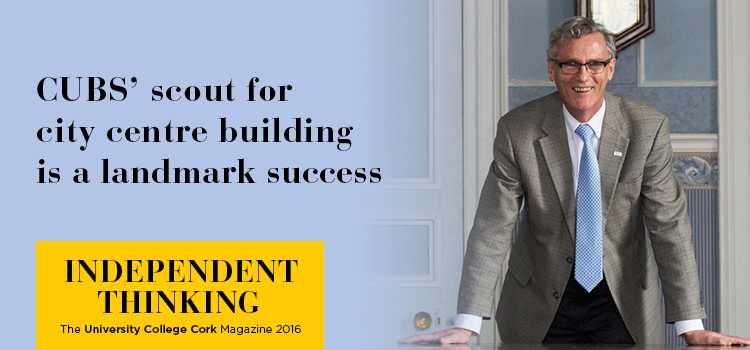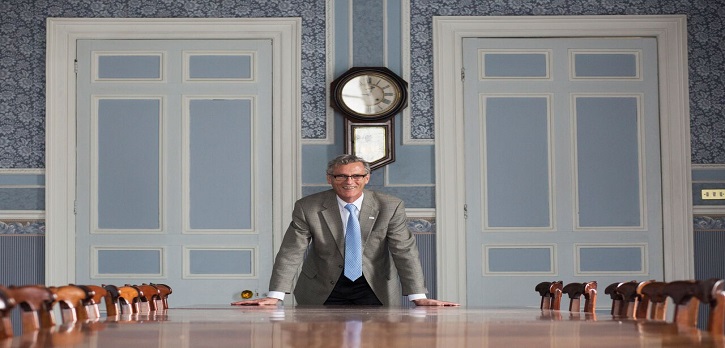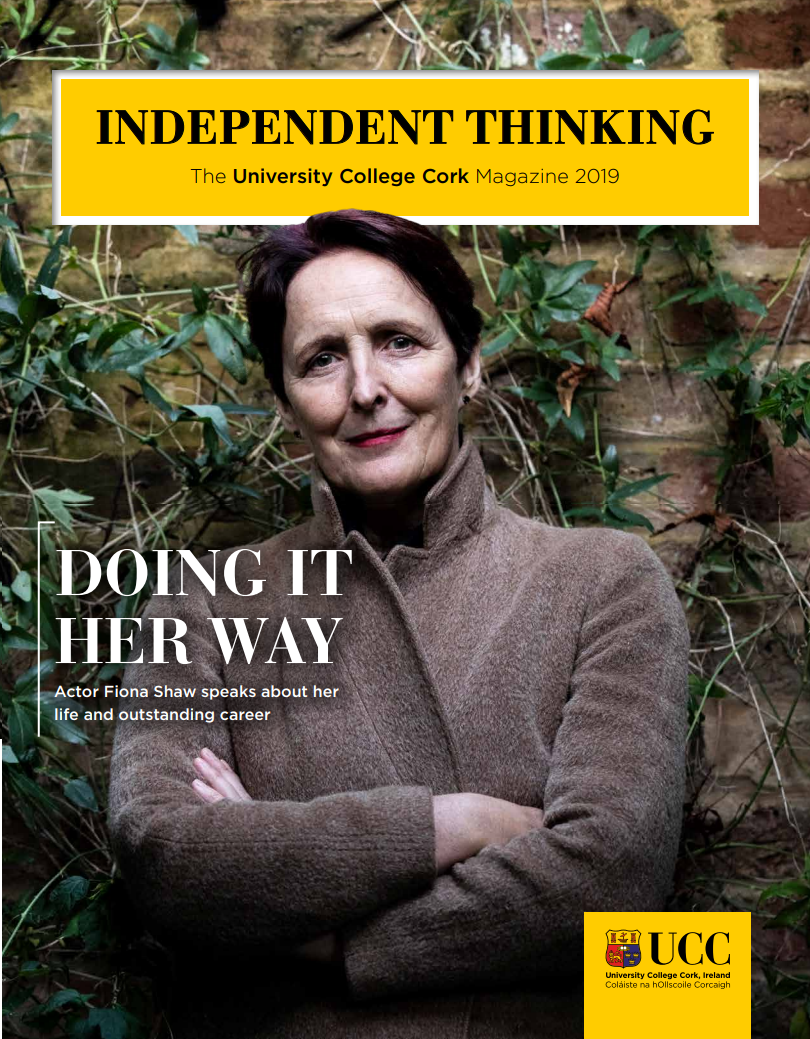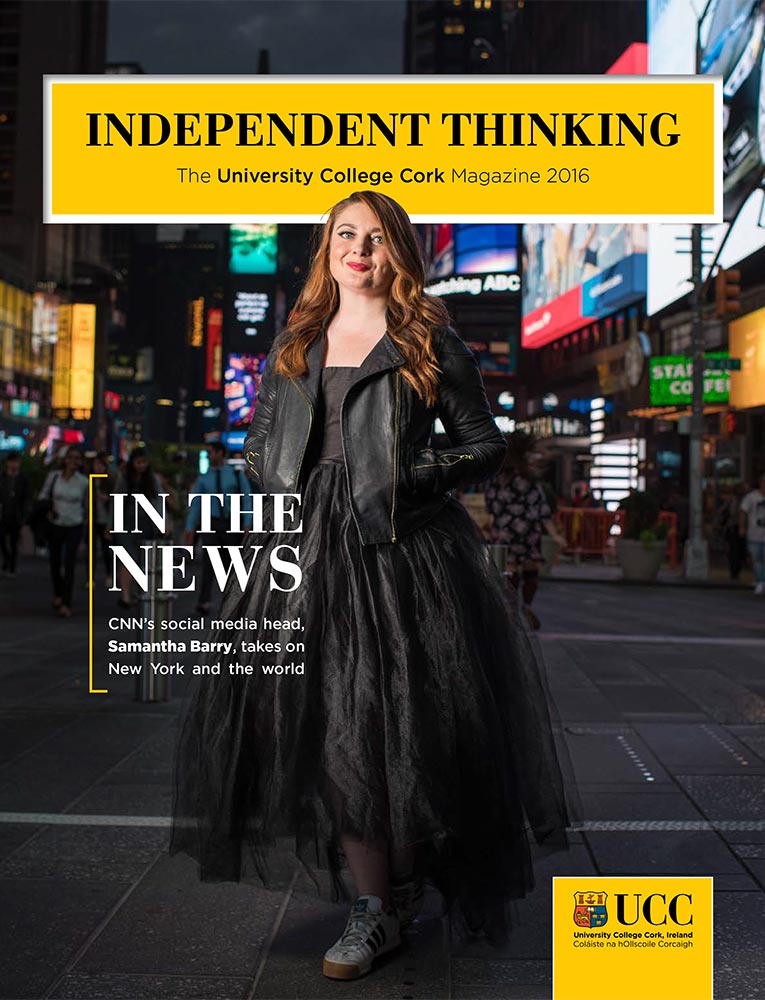Features
Cork University Business School

- 21 Nov 2016
(8 minute read)
The proposed transfer of Cork University Business School to the heart of the city’s finance centre and its ongoing recruitment of top-class professorial staff is placing it at the centre of its field in education, both locally and globally, reports Helen O’Callaghan.
A bold decision by Cork University Business School (CUBS) to locate its executive education facility in a landmark building, in an area rapidly becoming Cork City’s centre of business activity, says a lot about where CUBS sees itself.
The acquisition of the iconic Lapp’s Quay heritage building – formerly Cork Savings Bank – combined with CUBS’ determination to find a city centre location for its proposed €120m business school, is an ambitious move. Clearly it’s setting its sights on being a world-class player.
Town meets gown
Having a strong physical presence “downtown” in the heart of the finance and business district is paramount, says head of CUBS, Professor Ciaran Murphy. “It’s important that a business school should be close to the commercial activity of the city. It ensures students have an opportunity on a daily basis to imbibe the entrepreneurial experience and culture of Cork.”
It might be easier, he concedes, to find a green site if CUBS were to consider moving further out. “But I think you lose something by not being part of the dynamic presence in any city.”
In a sense, CUBS is giving new life and fuller meaning to the old real estate adage, “location, location, location”, which describes the three most important aspects of any property and which was coined by tycoon Harold Samuel. Because relocating its School from the heart of UCC’s campus, right into the city’s business hub – a 15-minute walk from UCC and a five-minute hop to Cork’s renowned English Market – is emblematic of where it is positioning itself in the sphere of business education.
Top-Class business school for the south of Ireland
"We’re going to produce graduates who will be thinkers, shapers, designers and developers of the future – essentially movers and shakers in the business sphere"
CUBS’ vision begins from the position that Cork and the southern region need a top-class business school of an international standard. “That for us is the key driver,” says Ciaran. He sees its reach going further. The business education delivered here will mark it out as a significant player on the national stage and it will have a global impact: be world class “from” Cork, rather than “in” Cork.
“Our students will be challenged to excel – but supportively. We’re going to produce graduates who’ll be thinkers, shapers, designers and developers of the future – essentially movers and shakers in the business sphere. We will emphasise the need for students to be inventive and entrepreneurial in their approach to business.”
Ciaran quotes the words of management consultant and educator Peter Drucker: “Since we live in an age of innovation, a practical education must prepare a man for work that does not yet exist and cannot yet be clearly defined.”
These words, he says, encapsulate what CUBS is about: “None of us can predict the milieu of progress that will happen in all sorts of areas – and what jobs will result. 1950s Ireland couldn’t have envisaged the types of jobs we do today or the sorts of people who’d work them. They’d have expected the majority to still be working the land and predominantly making things. At CUBS, we want to educate students to be agile thinkers, to move with developments and to help invent their own futures.”

Professor Ciaran Murphy, head of CUBS, in the former Cork Savings Bank. The iconic heritage building has been purchased as the new city centre location for executive business education in the Munster region. Pictures: Clare Keogh
Work placements at home and abroad
CUBS’ world-class education will be underlined by the offer to undergraduates of work placements and university (business school) placements abroad. “We want to develop more linkages with top business schools internationally, so students can do shared projects with students from business schools [abroad]. Many of our BComm students are already going abroad to business schools, mainly in Europe and the US, but some in Asia too.”
One vital element on which this world-class experience is predicated is recruitment of professorial staff. CUBS is committed to hiring 30 new professorial-level posts over the next four years. “We’re doing global searches for staff. We’ve had applications from all five continents. We’ve filled the first 10 posts – the vast bulk of appointees have international experience. We’re now embarking on a second round of recruitment.”
“A smart building for smart students”
Also essential in delivering this high-level education is what Ciaran terms “a smart building for smart students”. Currently spread over two buildings on UCC’s campus, CUBS has never had a purpose-designed/built business school building. And a vital element of the proposed new building will be a top-class digital infrastructure, enabling students to “be in contact with students anywhere in the world at any time and ensuring incredibly fast access to information”.
Meanwhile, acquisition of the former Cork Savings Bank building – with an investment of €5m – represents “great historical connectivity” with UCC, he says. “It was designed by the Dean brothers, who were also architects of UCC’s quadrangle buildings.”
A firm of heritage architects has been commissioned to repurpose the building (the stairs date back to 1917). “The boardroom is very striking, as is the banking hall, which will have a multi-purpose use – for holding events and for breakout meetings.”
Housed in a building that historically played an important role in the business and community life of Cork, the CUBS facility will now meet the region’s ongoing business education needs. Generic and customised programmes will position it as the go-to for executive education. “Staff at all levels of multinational and indigenous companies in Cork need continual up-skilling. And our offering isn’t just to the business community – large public sector organisations like the HSE and Cork City Council have a big requirement for ongoing training.”
 Picture: Rowan Davenport and Chris Wright
Picture: Rowan Davenport and Chris Wright
Irish Management Institute
The business school is in discussions with the Irish Management Institute (IMI) with a view to a merger with UCC. CUBS is already alma mater to the largest number of undergraduate students in any business school in Ireland – undergraduate intake increased by 15% in the last two years. Now, with the strength of the IMI brand and with the size of IMI’s client base, a merger will see UCC become the largest provider of executive education in Ireland. It will be UCC’s first Dublin campus and will make the university accessible to companies based in the greater Dublin region. “We’ll be able to tap into our alumni in a way we haven’t been before.”
Ciaran says a business school must be a two-way street. He sees an important role for adjunct professors in giving real-world experience to the scholarly mix. “It’s not just about CUBS providing graduates who’ll go out to the business world. We want to bring business to our students, so we’ll appoint top-class business leaders as adjunct professors. They will share experience, wisdom and views of the future with students and staff.”
Business leaders
CUBS is in the process of finalising an advisory board of distinguished external business leaders, drawn from national and international communities, whose input will help shape future direction of the School. This board, says Ciaran, will have a key role in keeping CUBS honest. “Our performance needs to be measured. We need to be held accountable to our vision and commitment – I will insist we are.”
In keeping with its unrelentingly outward focus, CUBS is actively seeking international students – and affiliations with other institutions of note. On the research front, the School wants to partner up with business universities globally. It has already teamed up with Zhejiang University, one of the top three universities in China, to conduct research into new technologies and services for the financial industry. “This summer we hosted a number of their staff and students in UCC for three weeks. And 10 of our research students, accompanied by staff, spent two weeks in Hangzhou. It’s an example of the type of research partnership we are seeking to develop.”
The School is also hoping to have completed a process of gaining international accreditation by 2018. The AACSB (Association to Advance Collegiate Schools of Business) accreditation is an international standard, but American-based. CUBS project manager Áine McCarthy says it’s the largest accrediting body for business schools in the world. “It’s regarded as a benchmark for business school quality across the academic community.”
CUBS has developed a brand new logo, along with its own website: https://www.cubssucc.com/



